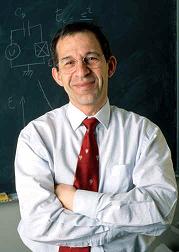

|
7:30 pm, Wednesday, February 8 Fairmont Social lounge, St. John's College
Quantum-mechanical electrical circuitsMichel H. DevoretDepartment of Applied Physics, Yale UniversityCould the bits of a computer be atom-like entities behaving quantum-mechanically? The miniaturization of transistors and Boolean gates down to single atoms or electrons has been envisioned as early as the 1980's, but it is only in the last decade that the superiority, for certain classes of problems, of the quantum computer over its conventional classical counterpart was understood theoretically. This discovery has spurred a flurry of activity aimed at implementing practically a "quantum machine" which would compute. In our own laboratory, we have followed the lead of superconducting integrated circuits, whose fabrication directly benefits from the micro- and nano-technology developed for semiconducting devices. The problem with solid-state implementations of "qubits" is their potentially strong coupling to unwanted degrees of freedom in the various materials of the circuit. Yet, we have shown experimentally in a particular superconducting circuit - the so-called "quantronium" circuit- that electrical symmetries could be exploited to suppress, to a large extent, this undesirable coupling. Recently, we have performed a fast state-projection readout using a microwave pulse. In the last few years, advances in Europe, Japan and the US have taken us to the stage where genuine quantum information processing, involving several qubits, can be engineered. Find out more by visiting his website. | |
| |

